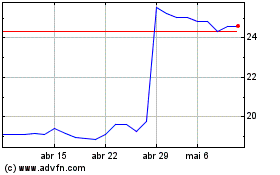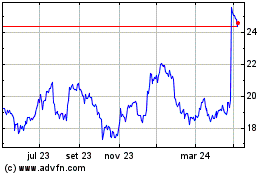Philips to Sell Majority Stake in Lumileds to Apollo for $1.5 Billion -- 2nd Update
12 Dezembro 2016 - 11:27AM
Dow Jones News
By Maarten van Tartwijk
AMSTERDAM--What does a CFIUS rejection cost? In the case of
Royal Philips NV, about $1.3 billion.
That is how much the Dutch conglomerate left on the table after
the Committee on Foreign Investment in the U.S. last year raised
objections to Philips's plan to sell a roughly 80% stake in its LED
lighting unit to a Chinese consortium. The committee is a secretive
U.S.-government interagency group that vets global deals on
national-security grounds.
Philips was in line to pocket $2.8 billion in the stake sale to
the Chinese, valuing the unit at $3.3 billion. After Philips
disclosed CFIUS had raised unspecified issues over the deal--the
committee itself typically doesn't disclose its decisions-- the
Dutch conglomerate dropped the transaction.
Now, Philips has a new deal: It said on Monday it agreed to sell
the same roughly 80% of the unit to New York-based private-equity
firm Apollo Global Management LLC. This time, though, Philips will
get $1.5 billion in cash for the stake, about 46% less than
envisioned in the Chinese deal. The agreement with Apollo values
the entire unit at $2 billion, or just over 39% lower than the
Chinese offer.
Philips Chief Executive Frans van Houten said the number of
potential buyers became "considerably smaller" after CFIUS blocked
the deal, resulting in a lower transaction price. CFIUS is unlikely
to raise concerns again as Apollo is based in the U.S., he
added.
The unit, called Lumileds, makes LED components and
automotive-lighting products. It is based in the Netherlands and
generated sales of about $2 billion last year. It has around 9,000
employees world-wide, with operations in more than 30 countries,
including a large research-and-development facility in San Jose,
Calif.
That U.S. link gave CFIUS jurisdiction to weigh in. The
committee has increasingly scrutinized global deals, including
transactions in which neither buyer nor seller are American.
Earlier this month, a Chinese bidder abandoned plans to buy German
chip maker Aixtron SE after CFIUS raised concerns and President
Barack Obama moved to block the deal on national-security
grounds.
Philips was surprised by the CFIUS concerns as Lumileds products
have a "standard technology," Mr. van Houten said.
For Philips, the sale marks another step in its efforts to
divest its 125-year-old lighting operations in an attempt to
concentrate on selling health-care technology products. Earlier
this year, it sold a minority stake in its general lighting
business through an initial public offering and intends to fully
exit the business in the coming years.
For Apollo, the transaction marks the latest in a year of
prolific deal-making despite high-price markets and intense
competition from corporate buyers. The firm expects to spend more
in 2016 than it ever has in a single year, co-founder Josh Harris
said on a call with analysts in October.
Write to Maarten van Tartwijk at maarten.vantartwijk@wsj.com
(END) Dow Jones Newswires
December 12, 2016 08:12 ET (13:12 GMT)
Copyright (c) 2016 Dow Jones & Company, Inc.
Koninklijke Philips NV (EU:PHIA)
Gráfico Histórico do Ativo
De Mar 2024 até Abr 2024

Koninklijke Philips NV (EU:PHIA)
Gráfico Histórico do Ativo
De Abr 2023 até Abr 2024
